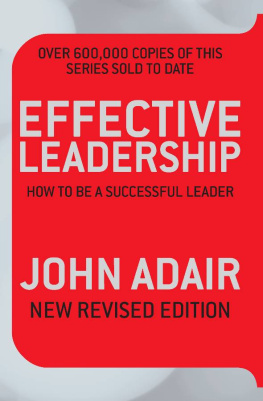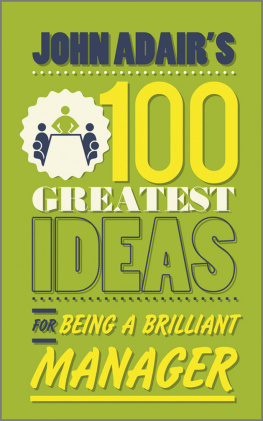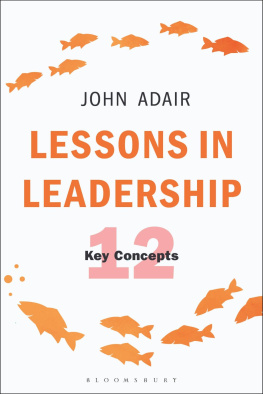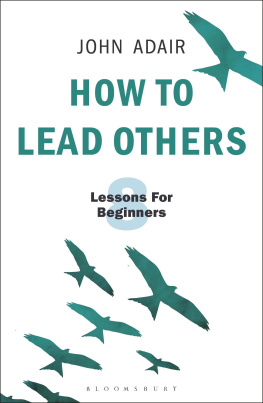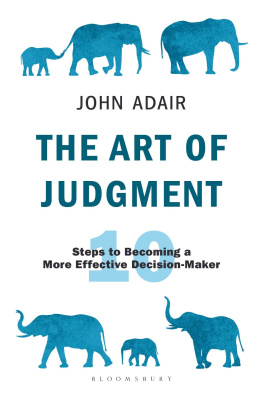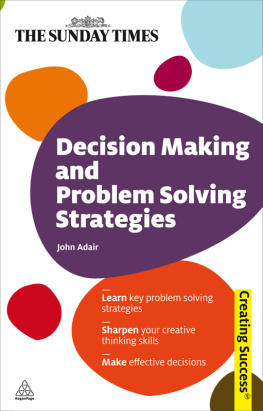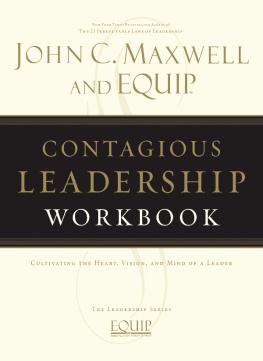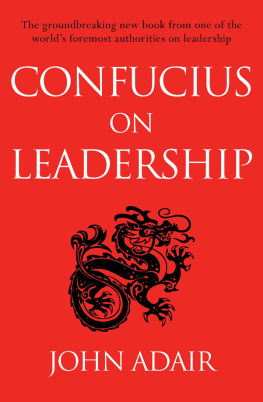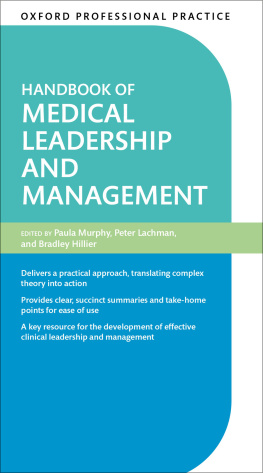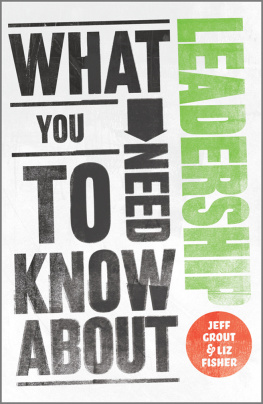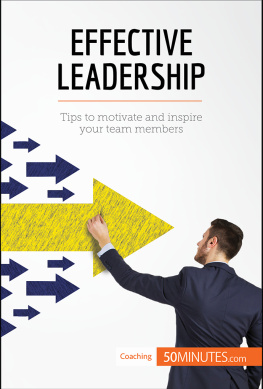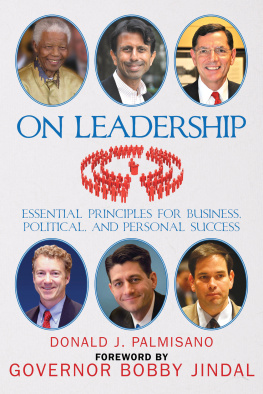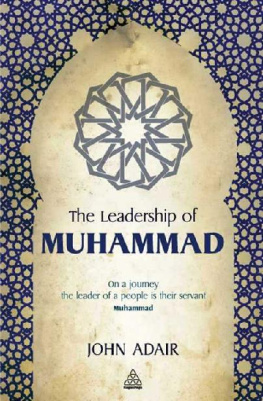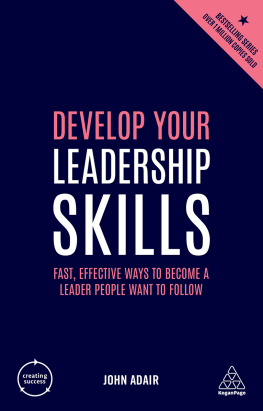
Educated at St Pauls School, John Adair has enjoyed a varied and colourful career. He served in the Arab Legion, worked as a deckhand on an Arctic trawler and had a spell as an orderly in a hospital operating theatre. After Cambridge he became Senior Lecturer in Military History and Leadership Training Adviser at the Royal Military Academy, Sandhurst, before becoming Director of Studies at St. Georges House in Windsor Castle and then Associate Director of The Industrial Society.
In 1979 John became the worlds first university Professor of Leadership Studies at the University of Surrey. He holds the degrees of Master of Arts from Cambridge University, Master of Letters from Oxford University and Doctor of Philosophy from London University, and he also is a Fellow of the Royal Historical Society.
In 2006 the Peoples Republic of China conferred on john the title of Honorary Professor of Leadership Studies in recognition of his outstanding research and contribution in the field of Leadership. In 2009 the United Nations appointed him to be Chair of Strategic Leadership Studies at its central college in Turin.
www.johnadair.co.uk
www.adairleadershipdevelopment.com
Other titles in John Adairs
EFFECTIVE series
EFFECTIVE Communication
EFFECTIVE Decision Making
EFFECTIVE Innovation
EFFECTIVE Motivation
EFFECTIVE Teambuilding
EFFECTIVE Time Management
FOREWORD
Welcome to this fully revised second edition of Effective Leadership. The book first appeared in 1983 and it has been continuously in print ever since.
Authors sometimes spoil their best book when it comes to revising and updating it. My approach has been a cautious one. Rather like a good picture restorer I have limited myself to removing old varnish and flaking paint, and touching up here or there with new examples and case studies, so that you may encounter the original in all its simplicity, colour and freshness.
I hope that the book will serve you better as a wise guide, a firm support and an encouraging friend as you progress upon the path of leadership.
John Adair
2009
INTRODUCTION
Ideas about leadership have changed considerably in recent times. People today are better educated and more articulate. They can no longer be commanded or bossed about in the same way as before. Throughout the world there is a growing need for good leaders and leaders for good. That is the background for our journey together in these pages.
The aim of this book is simple. It is to help you to improve your own abilities as a leader.
I am assuming that you have a direct personal interest in leadership. You may be in a position which you suspect or have been told requires leadership. You may already be an experienced leader, or you may be on the threshold of a career in management in which you will be expected to become a leader. In each case, leadership matters to you.
How can you improve your leadership ability?
- You need to stimulate your own awareness of leadership in all its aspects. That means being aware of when it is required in a given situation and aware of when it is lacking. It also entails an awareness of the changing values of society (and industry, which reflects those values), which will deepen your awareness of the importance of good leadership if free men and women are to cooperate effectively.
- You need to establish your understanding of the principles, requirements or functions of leadership. The poor leadership of many managers can be attributed, in part, to ignorance. No one ever introduced them to the functions of leadership, so they miss out some vital factor. A good leader understands the whole spectrum of leadership behaviour, and knows when a given function is required.
- You need to develop your skills in providing the necessary functions. This book will give you guidance not only on when to do a particular action, and why it should be done, but also how it should be done. It is concerned with techniques in a wide sense, namely the methods you must practise in order to achieve your desired aim of becoming a better leader. But this book will not teach you much about techniques in the narrower sense the formal or mechanical tricks which are often taught at the expense of the art of leadership as a whole. Concentrate on the basics and leave the tricks of the trade to the charlatans.
By the time you have finished the book I hope to have aroused or deepened your interest in leadership, to have persuaded you that there is an inner core of structure to it, and to have prompted you to see ways in which you can develop your own ability to the full.
HOW TO USE THIS BOOK
In order to get the most from this book it is best to read it once to get a general understanding. Then go back and work through the checklist questions and exercises. If you can persuade a friend or colleague to monitor your answers, so much the better.
Do not assume that you have to start from the beginning and read through to the end. The book is organized to move from the general to the more particular; from the whole to the specific part. Some people prefer to learn by starting off with the particular (e.g. drills, skills or techniques) and moving to general. If you belong to this group it may be better for you to start with Part Two and work hard on that, then read Part One. The more general ideas in Part Three are designed to stimulate further thought. You may also prefer to complete the checklists at the end of most chapters before reading the chapter rather than afterwards. Decide your strategy for using the book now, according to your depth of interest and preferred method of learning.
HOW WE LEARN
Regardless of which approach you adopt or how carefully you read this book, you will learn nothing about leadership unless you make a conscious effort to relate the points to your real life experience. It is essential to bear in mind that people learn by the interaction of

It is when sparks jump between these two poles the general and the actual that learning occurs. So you need both. The various case studies and examples in this book are designed to be stepping stones:

Equally, the process must work in reverse. Your practical knowledge, gleaned from both observation of actual leaders and your own practical experience, must be brought to bear in a constructively critical way on the ideas presented in this book.
So read the book reflectively. Put it down occasionally and work on some incidents in your own career which are illuminated by the book, since personal reflections will illustrate leadership lessons better than any second-hand case study.
The value of having some principles, guidelines or checklists of leadership is that they will cut down the time you take to learn from experience. As Henry Ford said, By the time a man is ready to graduate from the University of Experience he is too old to work! George Bernard Shaw added that the fees you have to pay in that hard school are exceptionally high! Nothing can prevent you from making your own mistakes, for book learning is not the same as practical wisdom. But trial and error is an expensive and over-long way of learning about leadership: it is cheaper and saves time if you learn from other peoples mistakes. The beginner in leadership should look upon this book as a sketch map of an undiscovered country. The real terrain will not always look like the rough map in ones hand. In time one will be able to draw a better map, but at least this serves as a guide.
Next page
